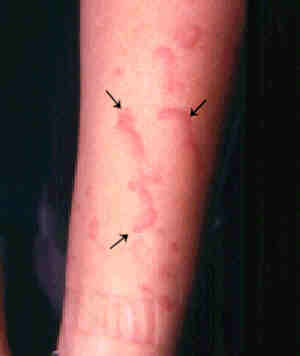|
U
Ulcers | Urticaria
ULCERS
An ulcer is a defect
in the skin involving the epidermis and dermis. The causes are
many:-
Causes
- Trauma
-
- Physical trauma
- Pressure as in pressure
sores or decubitus ulcers
- Chemical burns
- Thermal or radiation burns
-
- Blood disorders
-
- Sickle-cell anaemia
- Polycythaemia rubra
vera
- Dysglobulinaemias
-
- Blood vesssel disease
-
- Arteriosclerosis causing
blockage of the arteries
- Raynaud's
syndrome due
to spasm of the arteries
-
- Vasculitis
- Varicose
ulcer
- Metabolic disorders
-
-
- Neurological disorders
causing neuropathic ulcers (ulcers caused by repeated trauma
to an area that has lost its sensation of pain as a result of
nerve damage).
- Infections
-
-
- Skin cancers such
as squamous cell cancer,
basal cell cancer, malignant melanomaand Kaposi's
sarcoma
- Other conditions
-
What you can do
- You should consult
a doctor.
-
- What the doctor
may do
- Determine the cause
and treat accordingly.
TOP
URTICARIA
Urticaria is skin condition
characterised by itchy weals that come and go. It is a very common
condition and affects at least 20% of individuals at some time
during their lives.
Cause
Urticaria is caused by the release of histamine, a chemical cause
the blood vessels to leak, leading to fluid accumulating in the
skin and causing it to swell. Doctors divide urticaria into acute
and chronic cases with 6 weeks as the dividing line.
- Acute urticaria may
be caused by:
-
- Food allergy. This
may be caused by any food, including nuts, strawberries and shellfish
and food preservatives and colourings.
- Drug allergy which
may be caused by any drug, including x-ray contrast medium, aspirin,
codeine, penicillin and sulphonamides.
- Allergy to insect
bites and stings, eg., bees and wasp stings.
- Hypersensitivity reaction
to infections.
Acute urticaria is
usually brief and the cause can often be ascertained.
- Chronic urticaria
may be caused by:
-
- Connective tissue
disease - sometimes urticaria is a sign of systemic
lupus erythematosus or some other connective tissue disease.
- Hidden or chronic,
low-grade infections such as dental abscesses and sinusitis.
- Parasitic infestations.
- Physical causes (called
physical urticaria):
-
- Dermographism - induced
by stroking or scratching the skin. The weals occur the line
of the strokes or scratches.
- Cholinergic urticaria
- induced by sweating.
- Pressure urticaria
- induced by pressure on the skin.
- Cold urticaria - induced
by cold.
- Heat urticaria - induced
by heat.
- Solar urticaria -
induced by ultraviolet light.
- Aquagenic urticaria
- induced by contact with water.
- Vibratory urticaria
- induced by vibration.
- Pressure urticaria
- induced by pressure.
- Contact
urticaria -
caused by contact allergy to proteins in animal saliva, meat,
fish, plants and vegetables or allergy to chemicals in medicines,
cosmetics and white flour.
-
- Emotional stress
- Inheritance (inherited
angioedema).
- Allergy to food and
food additives, eg., colourings and preservatives.
- Atopy, ie., an inherited
predisposition to atopic dermatitis, asthma (wheezy breathing)
and allergic rhinitis (itchy nose) is associated with a greater
propensity to develop urticaria.
- Idiopathic (unknown).
The cause of chronic
urticaria is more difficult and in some cases, the cause simply
cannot be found despite extensive investigations. This type of
urticaria is called idiopathic chronic urticaria.
Symptoms
- Weals or smooth slightly
raised patches that are redder or paler than the surrounding
skin.
- The weals may be of
many different shapes. In dermographism, the weals occur in lines.
In cholinergic urticaria, the the weals appear as small red papules
(bumps) surrounded by a red flare. In other types of urticaria,
the weals may be round, ring-like or map-like.
- The weals are transient,
lasting from a few minutes to 24 hours in some. They do not normally
leave a mark or stain on the skin when they disappear (contrast
with urticarial vasculitis).
- The weals may recur
at certain times of the day.
- Severe itching.
- Angioedema is a deeper
form of urticaria. It may occur anywhere on the body but is more
troublesome when it affects the eyes (causing the eyes to close)
and lips, tongue and throat (causing suffocation). Inherited
angioedema
is caused by a deficiency of a protein called C1 esterase inhibitor
and other family members usually suffer from it, as well.
 |
Urticaria.
Click
on image for larger view |
Complications
- Anaphylaxis is a severe reaction in which
the urticaria is accompanied by chest tightness, wheezing, giddiness
and collapse. It may be fatal.
- Angioedema affecting the throat may cause
suffocation.
What you can do
- You should consult
a doctor to determine the cause.
- Take antihistamines
to control urticaria.
- Apply calamine lotion
to relieve itching.
- See a doctor if there
is no improvement.
- Go to the nearest
Accident and Emergency if urticaria is accompanied by chest tightness,
wheezing, difficulty breathing or swallowing, dizziness or faintness
and/or swelling of the eyelids, lips or tongue. (see anaphylaxis
and angioedema).
- Keep a diary card
of items you have taken by mouth or come into contact with. It
will help the doctor determine the cause in cases of chronic
urticaria.
What the doctor
may do
- Prescribe antihistamines.
- Prescribe oral steroids for severe
acute urticaria.
- Hospitalise severe
cases for management.
- Conduct tests to determine
the cause.
- Recommend elimination
diets, if appropriate.
- Prescribe anabolic
steroids such as stanazolol and danazol for hereditary angioedema.
TOP |
